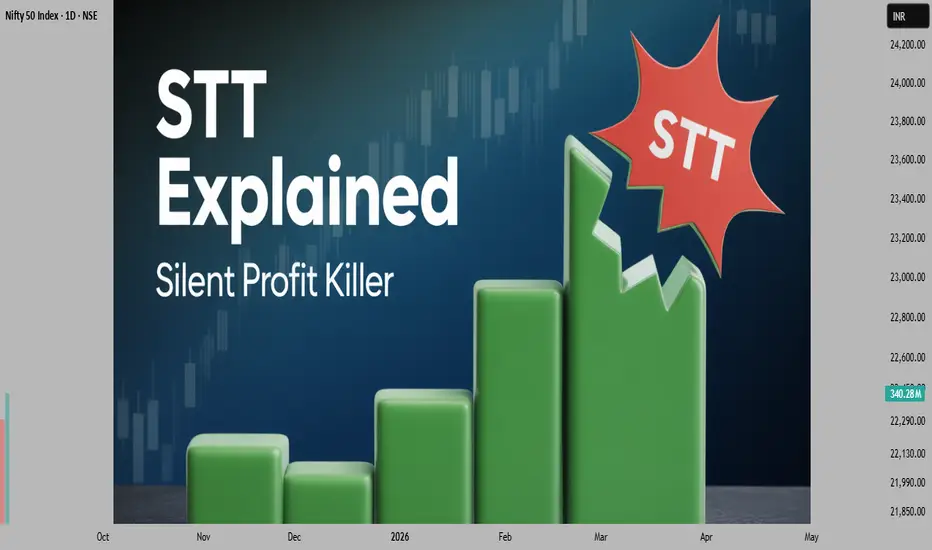Hello Traders!
Many traders calculate their profit after entry and exit, but forget a hidden cost that reduces it every single time: STT (Securities Transaction Tax).
It doesn’t look big on paper, but over time it silently eats into your profits. Let’s break it down in simple terms.
What is STT?
STT is a tax charged on the value of every buy/sell transaction in equities, derivatives, and ETFs.
It was introduced to generate revenue for the government and applies to all market participants.
Example: If you buy shares worth ₹1,00,000, you pay a small percentage as STT. The same applies when you sell. In options and futures, it’s mostly charged on the sell side.
Where Does STT Apply?
Why Traders Must Care About STT
Rahul’s Tip:
Always calculate the real cost of trading, not just entry and exit points. Brokerage, STT, GST, exchange fees, all matter.
Sometimes the best trade is not the most frequent one, but the one with the best cost-to-profit balance.
Conclusion:
STT may look small, but it has a big impact over time.
The difference between a losing trader and a winning trader is often not the strategy, but how well they manage costs like STT.
If this post cleared your doubts on STT, like it, drop your experience in comments, and follow for more trading education that really matters!
Many traders calculate their profit after entry and exit, but forget a hidden cost that reduces it every single time: STT (Securities Transaction Tax).
It doesn’t look big on paper, but over time it silently eats into your profits. Let’s break it down in simple terms.
What is STT?
STT is a tax charged on the value of every buy/sell transaction in equities, derivatives, and ETFs.
It was introduced to generate revenue for the government and applies to all market participants.
Example: If you buy shares worth ₹1,00,000, you pay a small percentage as STT. The same applies when you sell. In options and futures, it’s mostly charged on the sell side.
Where Does STT Apply?
- Equity Delivery: STT applies on both buy and sell transactions.
- Equity Intraday: STT is charged only on the selling side.
- Futures: STT applies only on the sell side of the contract.
- Options: STT applies on the sell side, but at a higher rate compared to futures.
Why Traders Must Care About STT
- It Reduces Net Profit: Even if your trade looks profitable on the chart, STT takes away a portion. In short-term trading, these small cuts add up.
- Impacts Scalpers & Option Sellers Most: Since they do high-frequency trading, STT can eat into a large chunk of their returns.
- Hidden in Brokerage Statements: Many traders blame “brokerage” for high costs, but in reality, STT is often the bigger factor.
Rahul’s Tip:
Always calculate the real cost of trading, not just entry and exit points. Brokerage, STT, GST, exchange fees, all matter.
Sometimes the best trade is not the most frequent one, but the one with the best cost-to-profit balance.
Conclusion:
STT may look small, but it has a big impact over time.
The difference between a losing trader and a winning trader is often not the strategy, but how well they manage costs like STT.
If this post cleared your doubts on STT, like it, drop your experience in comments, and follow for more trading education that really matters!
Rahul Pal | BD Manager @CoinW Exchange Dubai
Helping KOLs, Partners earn up to 70% rebate
Recommended Broker: tinyurl.com/RahulCoinW
Free Telegram: spf.bio/c1lkb
Website:realbullstrading.com
Signals:wa.me/919560602464
Helping KOLs, Partners earn up to 70% rebate
Recommended Broker: tinyurl.com/RahulCoinW
Free Telegram: spf.bio/c1lkb
Website:realbullstrading.com
Signals:wa.me/919560602464
Related publications
Disclaimer
The information and publications are not meant to be, and do not constitute, financial, investment, trading, or other types of advice or recommendations supplied or endorsed by TradingView. Read more in the Terms of Use.
Rahul Pal | BD Manager @CoinW Exchange Dubai
Helping KOLs, Partners earn up to 70% rebate
Recommended Broker: tinyurl.com/RahulCoinW
Free Telegram: spf.bio/c1lkb
Website:realbullstrading.com
Signals:wa.me/919560602464
Helping KOLs, Partners earn up to 70% rebate
Recommended Broker: tinyurl.com/RahulCoinW
Free Telegram: spf.bio/c1lkb
Website:realbullstrading.com
Signals:wa.me/919560602464
Related publications
Disclaimer
The information and publications are not meant to be, and do not constitute, financial, investment, trading, or other types of advice or recommendations supplied or endorsed by TradingView. Read more in the Terms of Use.
